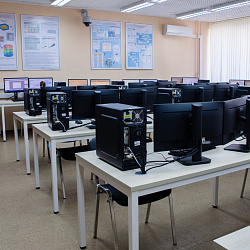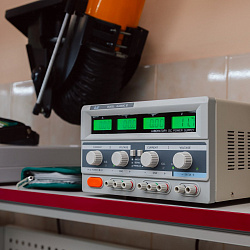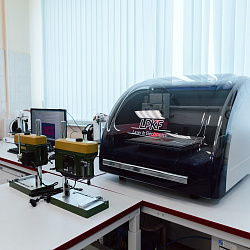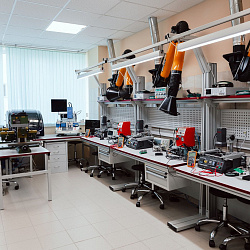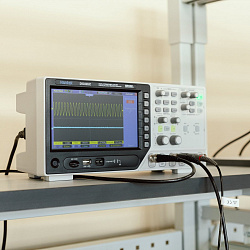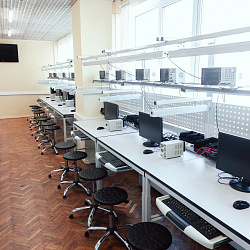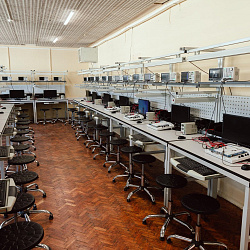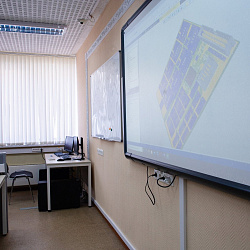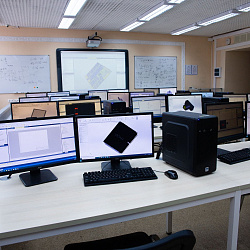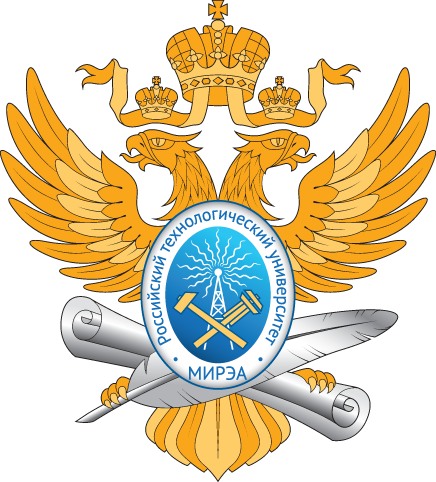Three new laboratories opened at RTU MIREA
New laboratories have started working at the Design and Production of Radio-electronic Equipment Department of the Institute of Radio Engineering and Telecommunication Systems.
Laboratory for digital design and modeling of radio-electronic equipment
In this laboratory students will be able to acquire practical skills for working on professional specialized CAD software.
The main areas of research are parametric design, development of computational software macros, modeling of radio-electronic devices, optimization of design and technological solutions, and creation of cross-platform applications for the analysis and virtual testing of radio engineering systems and complexes.
The laboratory has the core equipment and software listed below: 25 high-performance autonomous workstations based on Intel and Elbrus processors with two monitors for digital design and simulation of radio-electronic devices. It is noteworthy that the available software includes the first domestic CAD of Delta Design Professional printed circuit boards, CAD SolidWorks in full configuration, and electrodynamic CAD HyperWorks Altair FEKO.
Radio-electronic equipment assembly and installation laboratory
The main areas of research include the development of control programs for technological equipment; analysis, measurement and testing of the circuitry of radio-electronic products; spectrometry of analog and digital radio signals; precision assembly and installation of printed micromodules of increased assembly density conforming to modern technological standards; manufacturing of printed circuit boards by milling; and experimental manufacture of complex body products.
The laboratory has the up-to-date core equipment, such as the ACHI IR 6500 Infrared soldering station and the WELLER WR3000M universal repair soldering station, for the assembly, installation, repair and service of radio-electronic products.
TBS1102B Tektronix digital two-channel oscilloscope, R&S HMF2550 functional generator and NI ELVIS II+ workstation for radio engineering measurements, prototyping and analysis of device signals and the LPKF ProtoMat S63 milling and drilling machine for the manufacture of double-sided printed circuit boards of projects up to the 5 class of accuracy are also used in the laboratory.
Laboratory for tuning and adjusting radio-electronic equipment
It is worth mentioning that the key areas of research carried out in the laboratory deal with the creation and organization of programs for radio-technical measurements and testing of radio-electronic equipment, the development of methods for analysis, adjustment and tuning of functional units of a radio-electronic product, systemic modeling of radio-electronic devices on virtual measuring platforms.
The laboratory has the following core equipment and software:
25 automated workstations based on HP 260g2 nettops operating in a system complex with the radio measuring equipment: the HANTEK DSO4202C two-channel digital oscilloscope, the HANTEK HDG2082B two-channel functional signal generator, the HANTEK 365A signal data logger, the QJ2002C stabilized power supply necessary to provide conditions for laboratory measurements, tuning and adjustment of electronic equipment. The LabVIEW software environment by National Instruments, the SciLab program, and the specialized software operating as part of the equipment presented deserve special mention.




